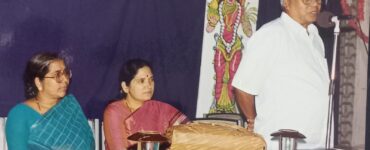Telugu: Tilak
[ Devarakonda Balagangadhara Tilak (1st August 1921- 1st July 1966), better known as Tilak, was an exceptional poet and short story writer in Telugu. His expression was classical, but his ideas were thoroughly modern.
Most of us believe, if it comes to that, that we can make objective assessment or evaluation of things in front of us. Tilak beautifully exposes, without comment, the fallacy behind that conviction presenting how our perceptions define and determine what we see. We are victims of our own strong beliefs.]
Somewhere in the market in a big city, a woman was sitting on a bench. She was looking gorgeous and graceful. She was like the Aurora Borealis at the North Pole. She was like Helen. She was as true, and as false, as a dream. Her half-open eyes looked like doors left ajar … opening into other worlds. There was, however, a lurking shadow of gloom in her eyes. An exotic charm gleamed languorously through those eyes. She wore fine, premium, sparkling zari clothes. Nobody knew who she was or why she was sitting there like that.
People from all walks of life thronged to have a look at her. And, there was a traffic jam. Even the policeman who came there to clear the traffic was wonderstruck and stood there looking at her. Why? From all the educated, poets, politicians, scientists to anybody you name, they were there – looking at her with insatiable desire and satisfaction. She was sitting on a high pedestal; and at that height her tender movements were barely noticeable to the beholders.
“The more I watch her the more I feel I am doing injustice to my wife; man should keep himself away from woman and money. Come on, let’s go,” Sastry called out his friend.
“The more I look at her, the more I am reminded of the infidelity of my wife; so unjust and so unfair. I can remain here for ages watching unabashedly at her and her curves. I am least inclined to come home,” replied Sarma.
“What is that you achieve by just watching? Her youth is a myth. Just like our wives, she turns old and ugly after two pregnancies.”
“You ask me what will I do? I shall marry her. If it is not possible, I will keep her,” replied Sarma.
“That is immoral,” said Sastry.
“What is morality?” quipped Sarma.
“The dialectics of morality and immorality melt away before beauty. Only beauty is the ultimate truth. The rest of the things are mere fiction. Adore the beauty. She is a Goddess!” remarked a curly-haired person.
“No. She is not a goddess. She is my valentine,” pronounced a poet bashfully, looking askance at her. “My heartthrob flashed nebulously before me and disappeared. I am unable to forbear her separation. I made an enduring quest for her and her whereabouts. I searched every house, every beach, and every nook in women’s colleges. When I was standing on the crest of despair ready to plunge into the sea of death, I found her. Who is she? The very person of my fancy and my love I am enduring this sufferance of separation. She is the fruit of my meditation.”
Meanwhile, everybody heard a big shriek. Someone walked up flailing his hands at her and said, “She is Mary Antoinette. After she was guillotined in French Revolution, she was born again in India. Democratic forces should not be lured by her. She must be put to death again.”
“She is so charming. I cherish spending a night with her. Hey Purohit! What is her price?” asked a businessman.
“She is a bourgeoise. Nothing else. She is the arch enemy of the oppressed classes of the world!” cried a youth in shorts and disheveled hair.
“Means what?” asked somebody.
“Her milk white cheeks and silken skin, and eyes are unmistakably marks of capitalism. Imagine how much blood had been shed to give her cheeks that crimson hue? And how many people had to go naked to dress her in that zari sari? She is a product of unfair economic practices. Her reaction is fascism. Dangerous! Insufferable!”
“Yet, she looks beautiful and shapely! What to speak of her looks and her bosom! God! She is intoxicating!” said a coolie.
“Look! That is slavery customized. Comrade! Try to understand that she is squarely responsible for the condition into which you are dragged into. Join the Union of coolies. You should look at the world only from an economic perspective. She is an economic evil. We must rise against her. Look! Here is my slogan: Clench the wench on the bench!” hailed the youth in shorts hugging the coolie.
A saintly minstrel strumming his tambourine walked up to the place and addressing all people, said, “Gentlemen! This world is a myth. A big incomprehensible myth! A woman is but a stinking pit endowed with flesh and blood. Why do you fall into that illusion?” and picked up his old refrain,
“Oh, my heart! Don’t get entangled into the illusions of life!”
Another man came running and said, “She is my mother! Make no mistake.”
Everyone looked at him in bewilderment.
“Is it?”
“Poor fellow!”
“Incredible!” said people.
They flocked around him.
“She is my mother! For that matter, every other woman is my mother! If you have any doubts, please read the Bhagavata. Jesus, Buddha, and Gandhi… they all revered woman as mother. She is a Mother Goddess! Goddess of Truth and Justice! Goddess of Spinning Wheel!” said the person adjusting his Gandhian cap.
“Wait! Let me tell you what that figure on the bench is!” said a thin-lipped, middle-aged person with binoculars hanging by his neck. Everyone turned towards him eagerly. He watched her closely focusing his binoculars on her for fifteen minutes and finally he declared,
“To say that this object is beautiful is purely subjective. That means, it is an opinion an onlooker forms in his mind. The love expressed by the poet for her- is a sentiment. He should take some medicine to get cured of his infatuation. As per the biological features, she is a woman. I could only see those features. If you want to know more, read Darwin. She is useful for perpetuation of progeny. Do you know how procreation happens? The glands within us…”
A coolie chewing his cigar interrupted him, saying, “Oh! After watching her for half an hour you say she is a woman! What a revelation from you! What a man you are!”
“Me? I am a scientist. As per biology, she is a woman. Yet, I cannot prove it from this distance. I must examine her in some more detail.”
He walked away with giant strides.
“Oh, my darling!” cried the poet.
“Shut up that darling and carling! If I employ her in my shop, I will reap a harvest of profits! What do you say, Chenchayya?” enquired a Marwari.
A lean person, who was sitting close by the bench till then, stood upon the bench. He covered the figure with a cloth, lifted it easily overhead and addressing the gathering, he said, “Brothers and sisters! I sculpted this figure. This idol is mine. Nobody came forward to buy this idol. I am not destined to sell this here. I am leaving for another station.” He got down the bench and started walking briskly.
“His art has no purpose,” commented somebody.
“Art is for art’s sake. What more purpose do you expect?” countered another.
“For that matter, there is no art except science,” said some other.
“Oh my! I am fainting. My love, my darling had petrified unable to find me. What do I do now? Ouch! This pain is unbearable! Mister, can you lend me two anna? Unless I take coffee immediately…” the poet begged someone.
The police officer who was watching the proceedings all the while blew his whistle. He tried to control the traffic and threatened to make use of lathi if necessary. People ran helter-skelter.
The following day, there was a report in a newspaper from New York. It read:
“A revolution in the city. Police opened fire… There were religious clashes. Hundred people died.”
*
(First Published in: Ananda Vani, Diwali Issue 1948)









Add comment